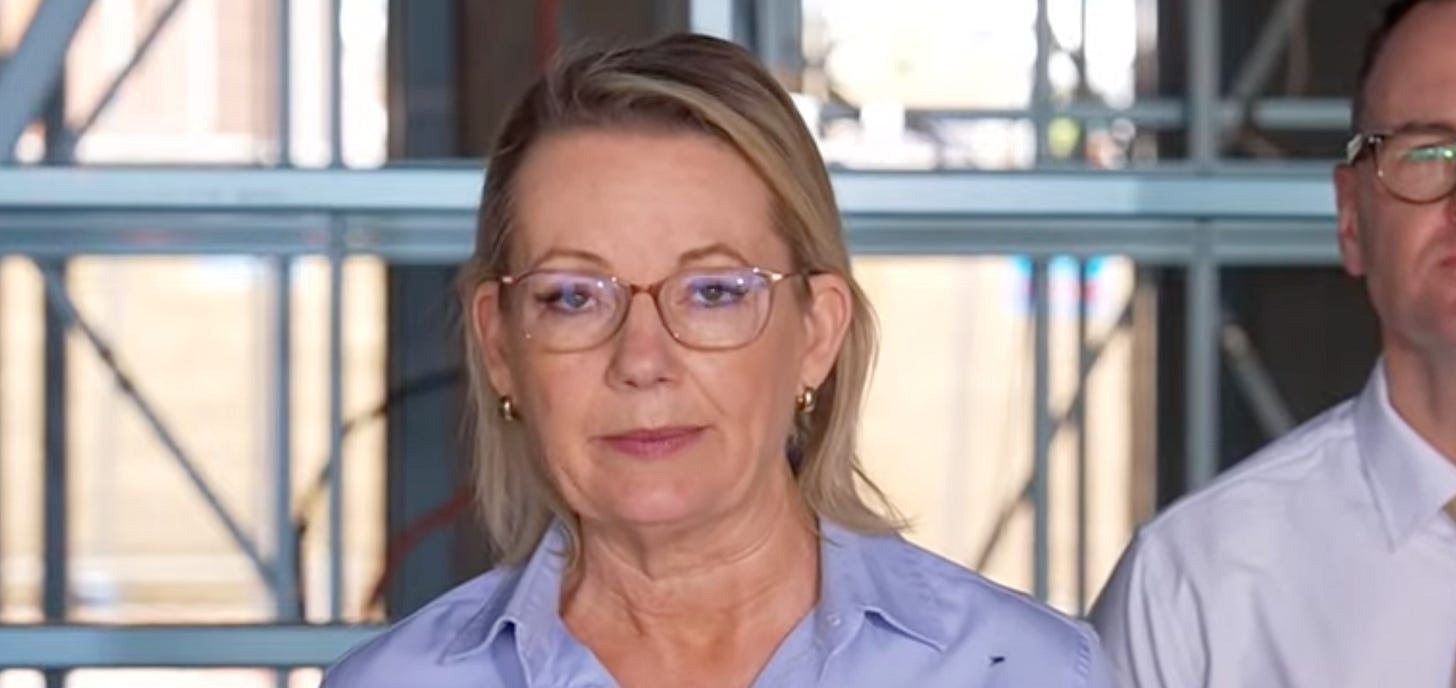Environmental Bill Faces Opposition from Both Sides as Coalition, Greens Reject Government Plan
Legislation promising faster approvals and $825 million penalties draws fire from left and right ahead of next week’s Parliament debut
This piece is freely available to read. Become a paid subscriber today and help keep Mencari News financially afloat so that we can continue to pay our writers for their insight and expertise.
Today’s Article is brought to you by Empower your podcasting vision with a suite of creative solutions at your fingertips.
Environment Minister Murray Watt’s sweeping environmental reform package faces opposition from both the Coalition and Greens, with critics on opposite sides attacking the legislation as simultaneously too restrictive for business and too lenient on polluters.
The bill, which introduces penalties up to $825 million for serious environmental violations and creates a new national Environmental Protection Agency, will be introduced to Parliament next week with no clear path to passage.
Coalition opposition leader Susan Ley signaled Thursday the government cannot count on her party’s support, calling the laws “a hand break on business.” Former Prime Minister Tony Abbott backed that position in an ABC Afternoon Briefing interview, saying the legislation will make development “harder, not easier.”
“If it’s a choice between cutting emissions and economic growth, I think you’ve got to go for economic growth every time,” Abbott told interviewer Patricia Karvelas.
Greens environment spokesperson Sarah Hanson-Young attacked from the opposite direction, telling ABC the legislation delivers “a whole lot for business industry” while providing “very little for protecting nature.”
“Business have their fingerprints all over this draft legislation,” Hanson-Young said. “They get a fast track, they get easier, cheaper and faster approvals for their projects.”
Truth matters. Quality journalism costs.
Your subscription to Mencari directly funds the investigative reporting our democracy needs. For less than a coffee per week, you enable our journalists to uncover stories that powerful interests would rather keep hidden. There is no corporate influence involved. No compromises. Just honest journalism when we need it most.
Not ready to be paid subscribe, but appreciate the newsletter ? Grab us a beer or snag the exclusive ad spot at the top of next week's newsletter.
The competing criticisms leave Watt searching for support in a Senate where his government needs crossbench votes to pass legislation. The minister confirmed he has encouraged business groups to lobby the Coalition and environmental organizations to pressure the Greens.
“I don’t rule out the possibility that we can ultimately get support from both the coalition and the Greens for this bill,” Watt told Sky News. “There are real improvements for both the environment and for business in this bill.”
The legislation allows the government to strip companies of up to 10% of their profits for particularly egregious environmental breaches, with the maximum fine reaching $825 million. A new national EPA would independently determine penalties based on factors including intent and previous offenses.
“We do need to send strong messages to businesses who might want to do the wrong thing that they will pay our price for that,” Watt said.
Minor violations would receive smaller fines under the tiered penalty structure. The minister said he would not direct the EPA on which companies to fine or penalty amounts.
The reforms aim to eliminate duplication between state and federal environmental assessments. Projects assessed by robust state processes against national environmental standards would not require separate federal review.
Watt cited housing redevelopment around the Queen Victoria market in Melbourne as an example of unnecessary delay from overlapping processes.
“That had to go through a state process. It had to go through a federal process. That did extend the delay in that project at a time when we desperately need housing,” he said.
The legislation also establishes definitions of “unacceptable impact” to give businesses clear red lines. Projects threatening World Heritage areas, internationally recognized wetlands or species viability would face automatic rejection.
Watt pointed to a proposed residential development on Ramsar-listed wetland in Moreton Bay outside Brisbane as an example that would be rejected under the new framework.
“This is really about trying to send really clear red lines to businesses about what types of projects just will not get through the system,” he said. “And so people shouldn’t be bothering wasting their time, their money trying to convince us to approve a project that is clearly unacceptable.”
Hanson-Young rejected that framing, arguing the minister retains too much discretion while providing insufficient environmental protection guarantees.
“The discretion of the minister is quite strong across this legislation,” she said. “I’m worried that when business gets all this certainty of faster approvals, easier process, a cheaper process, the minister himself saying it’s going to save business $7 billion, yet there’s no protection guarantees for nature.”
The Greens senator said requiring proponents to disclose emissions represents “the bare minimum” and criticized the minister’s inability to block projects based solely on climate impact.
“Even if they now have to say how much pollution they’re going to create, the minister can’t do anything with that. He doesn’t have to consider it before he gives them a tick of approval,” Hanson-Young said. “And that’s just not fit for today’s world.”
She described the package as delivering certainty for business while leaving environmental protection as “a third or fourth order” priority.
“Is this an Environment Protection Act or is it a business facilitation act?” Hanson-Young asked.
The legislation does not include a climate trigger but requires projects covered by the safeguard mechanism to achieve carbon neutrality by 2050. The requirement applies to facilities generating significant scope one and two emissions, including some coal mines.
“We’ve used exactly the same threshold in this legislation and for the first time would include a requirement when people lodge their applications,” Watt said.
Abbott read the legislation differently, telling ABC the reforms would restrict rather than accelerate development.
“My understanding of these new laws is that they are going to make it harder, not easier, to get developmental projects up and running,” he said.
The former prime minister’s comments signal broader Coalition skepticism toward the package despite some business groups expressing interest in faster approval processes.
Hanson-Young acknowledged her party holds significant leverage with the Coalition indicating opposition.
“The Coalition are saying the opposite. Isn’t it the case that the Minister is trying to find sort of the middle path through?” interviewer Patricia Karvelas asked.
“Business and industry’s fingerprints are all over this piece of legislation,” Hanson-Young responded. “They’re the only groups here who get certainty out of the package as it’s been drafted.”
She questioned whether the legislation can credibly protect nature while prioritizing business interests.
“You can’t be half pregnant, you can’t have a tree half standing,” Hanson-Young said. “The trees are standing and they’re providing habitat to the koalas or they’re not.”
The Greens senator said her party has not received complete draft legislation, with some details still being finalized.
“The minister’s department hasn’t even finished drafting the legislation at this point,” she said. “The minister’s trying to rush in a piece of legislation that hasn’t even been finished.”
Watt wants the reforms passed by year’s end, but Hanson-Young indicated extensive negotiations remain necessary.
“We’ve got a long way to go if there’s going to be a package that actually does what nature desperately needs,” she said.
The minister defended the consultation process, saying the government reached agreement with key business and environmental groups on major provisions after months of work.
“Anyone who is claiming that there is no improvement for business or the environment from this bill is lying and they just haven’t closely looked at the bill,” Watt said.
He framed opposition as a vote against both business and environmental interests.
“If they vote against these bills, they’ll be voting against improvements for business to get approvals done more quickly. They’ll be voting against improvements to the natural environment,” Watt said. “And I wouldn’t have thought either the Coalition or the Greens want to be accused of that.”
Hanson-Young refused to rule out blocking the legislation if it fails to meet environmental standards.
“What I’m worried about is what’s been put on the table right now doesn’t pass the pub test of protecting nature, doesn’t protect our native forests, which we know are in desperate need of saving, and it doesn’t protect the climate,” she said.
Abbott praised Kevin Rudd’s work on the critical minerals deal with the United States during the same interview, calling him “particularly useful when you’ve got to lobby Congress” due to his persistence.
“Kevin has the pester factor, if I may say so,” Abbott said. “And it seems that Kevin really did mastermind this critical minerals deal, which I think is all to the good.”
The former prime minister said cooler heads have prevailed on the Rudd controversy after initial reactions to Trump’s public mockery of the ambassador.
“I think everyone is a little bit more dispassionate about it now than they were in the first couple of hours after it happened,” he said.
Abbott also defended Pauline Hanson as “vastly more constructive” in her current Senate role compared to her first political career in the late 1990s, but urged former Nationals leader Barnaby Joyce to remain with his party.
“What we need is a strong alternative government, not more protest parties of the right,” Abbott said. “I’m a friend of Barnaby’s. I admire him. I can understand his frustrations, but I very much hope he sticks with the National Party.”
The environmental legislation represents the government’s most ambitious attempt to reform approval processes that industry complains delay projects for years while environmental groups argue fail to protect threatened species and ecosystems.
Whether Watt can bridge the gap between critics who see the reforms as going too far and those who say they don’t go far enough will determine if nearly two years of consultation produces actual legislative change or another stalemate.
Sustaining Mencari Requires Your Support
Independent journalism costs money. Help us continue delivering in-depth investigations and unfiltered commentary on the world's real stories. Your financial contribution enables thorough investigative work and thoughtful analysis, all supported by a dedicated community committed to accuracy and transparency.
Subscribe today to unlock our full archive of investigative reporting and fearless analysis. Subscribing to independent media outlets represents more than just information consumption—it embodies a commitment to factual reporting.
As well as knowing you’re keeping Mencari (Australia) alive, you’ll also get:
Get breaking news AS IT HAPPENS - Gain instant access to our real-time coverage and analysis when major stories break, keeping you ahead of the curve
Unlock our COMPLETE content library - Enjoy unlimited access to every newsletter, podcast episode, and exclusive archive—all seamlessly available in your favorite podcast apps.
Join the conversation that matters - Be part of our vibrant community with full commenting privileges on all content, directly supporting The Evening Post (Australia)
Catch up on some of Mencari’s recent stories:
It only takes a minute to help us investigate fearlessly and expose lies and wrongdoing to hold power accountable. Thanks!










